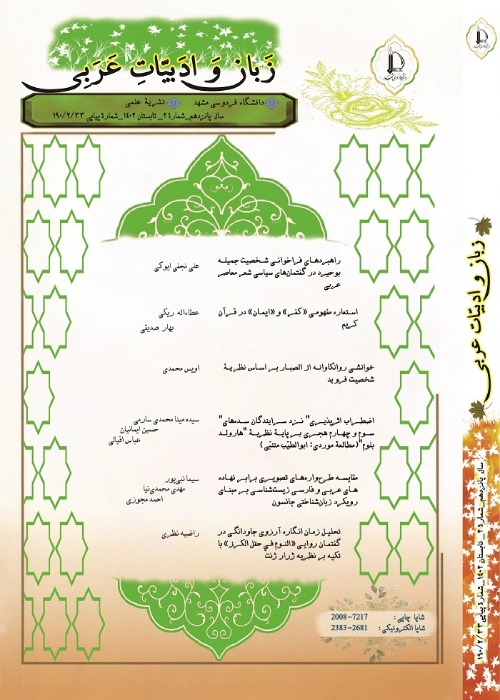An Analysis of Semiotic Insecurity in Ghadah Al-Samman's "Laylat Al Miliyar"
Author(s):
Article Type:
Research/Original Article (دارای رتبه معتبر)
Abstract:
Introduction
Social semiotics, as one of the subfields of semiotics, investigates into each text in its particular cultural and social context;, it also investigates into the issue of semiotic insecurity which is one of the topics of social semiotics and a subcategory of control model occurrings when the individual is aware of the contrast between their behaviors and the norms the people in that environment believe in. The Laylat Al Miliyar by Ghadah Al-Samman (2002) narrates the story of the immigration of a group of Arab citizens from Beirut to Geneva during the wartime, which is a good example of the representation of the phenomenon of semiotic insecurity and the reactions the characters of the story have. The present paper attempts to explain the phenomenon and its signs and to evaluate the relevant reactions through answering the fundamental question: What are the most outstanding reactions of the characters of the novel "Laylat Al Miliyar" in terms of the semiotic insecurity, and what are the effects and consequences of this phenomenon on the characters?As no research has been conducted to analyze this novel in terms of semiotic insecurity, the present research can add up to the importance and novelty of this paper.
Theoretical Framework
The issues of semiotic security or insecurity as the model proposed in the field of linguistics and semiotics are the phenomena concerning the value and objective norms of the society. In other words, the awareness of the individual of the inconformity of their linguistic or semiotic code (behavioral, clothing …) with the common and value-related semiotic and linguistic code of that of another society makes them face the feeling of insecurity. The individual stuck in the insecure conditions may react in one of the following ways: mutism, hyper correction, compensation. Concerning the mutism reaction, the individual attempts to minimize his social behavior and to remain silent. What we mean by the hypercorrection reaction consists of indulging in assimilating with the society the individual suffers complex inferiority, incompetency, and low power. The compensation reaction consists of changing the rules of the game in favor of oneself, such that they will adapt with the personal information.
Method
The research method of the present paper in the field of (theoretical) information collection, criticism, and investigation is descriptive-analytic
Results and Discussion
The present paper has achieved some results concerning the phenomenon of semiotic insecurity through the examination of the phenomenon in the novel Laylat Al Miliyar by the Syrian writer Ghadah Al-Samman (2002) and the reactions of each character in the story. The obtained results are as follows:In addition to the above-mentioned reactions, namely mutism, hyper correction and compensation, some other reactions can be seen in this semiotic model including imitating and, emulating the behavior of the other person with shyness and assimilation.The novels whose subjects are on immigration and in foreign countries can examine the semiotic insecurity model because all the characters are placed in another society with different norms.
First, the above-mentioned reactions, namely mutism, hyper correction and compensation seem to be the same because the individual attempts to make he/she look like the other person and emulate their behaviors, but the important difference between these two reactions lies in the hyper correction reaction. However, the individuals make themselves seem like the surrounding environment and assimilate with them in order to escape from the insecure conditions, without any exaggeration or indulgence. Finally, the difference between assimilation and imitation lies in constraint dominant on the imitation reaction and the free will dominating the assimilating reaction.
Conclusion
It can be concluded from the analysis of the novel of "Laylat Al Miliyar" in which the conditions of Arab immigrants to European countries are explained through outlining the multiple fates of the characters of his story, the writer has warned about the consequences of the possible approaches of each of the immigrant groups based on her knowledge of the impact of immigration from an Eastern undeveloped country afflicted with poverty and economic and living problems to a Western developed and modern country with different groups. Finally, she recommends that the immigrants return to their own country. She is aware of hegemonic relations, and she believes that insisting on maintaining the relation with the world, which makes the individuals to distance themselves from their own culture, and leads them to banality, isolation, and silence, is incorrect. In fact, the way to obviate these problems is to return to the real self and one's own repertoire, even though the individual has to bend over backs to keep their repertoire. In other words, feeling insecure resulting from the war atmosphere is better than the feeling of social-cultural insecurity. Ghadah Al-Samman accepts only the relationship consisting of challenging interaction from among the possible options available to the immigrants, while the individual can change the atmosphere according to their interests. However, even in these conditions the individuals have to come to terms with the norms that are not compatible with their soul.Keywords:
Language:
Persian
Published:
Journal of Arabic Language & Literature, Volume:10 Issue: 1, 2018
Pages:
167 to 191
magiran.com/p1936588
دانلود و مطالعه متن این مقاله با یکی از روشهای زیر امکان پذیر است:
اشتراک شخصی
با عضویت و پرداخت آنلاین حق اشتراک یکساله به مبلغ 1,390,000ريال میتوانید 70 عنوان مطلب دانلود کنید!
اشتراک سازمانی
به کتابخانه دانشگاه یا محل کار خود پیشنهاد کنید تا اشتراک سازمانی این پایگاه را برای دسترسی نامحدود همه کاربران به متن مطالب تهیه نمایند!
توجه!
- حق عضویت دریافتی صرف حمایت از نشریات عضو و نگهداری، تکمیل و توسعه مگیران میشود.
- پرداخت حق اشتراک و دانلود مقالات اجازه بازنشر آن در سایر رسانههای چاپی و دیجیتال را به کاربر نمیدهد.
In order to view content subscription is required
Personal subscription
Subscribe magiran.com for 70 € euros via PayPal and download 70 articles during a year.
Organization subscription
Please contact us to subscribe your university or library for unlimited access!



